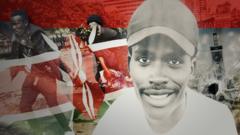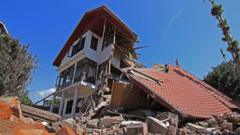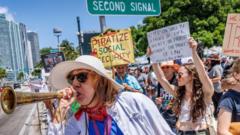Following a BBC Africa Eye investigation highlighting police and army brutality against protesters in Kenya, human rights organizations are calling for accountability from the government. The exposure of three deaths during June demonstrations has led to renewed public outrage and demands for justice.
**Calls for Accountability in Kenya after Security Forces' Actions During Protests**

**Calls for Accountability in Kenya after Security Forces' Actions During Protests**
Human rights organizations demand investigations into police and military actions following BBC's exposé on protester killings.
In June 2024, demonstrations erupted in Nairobi against a controversial finance bill aimed at raising $2.7 billion. These protests quickly turned violent, resulting in the deaths of at least 65 individuals, according to Amnesty International, while the government reported 42 fatalities. The BBC's documentary, "Blood Parliament," sparked widespread indignation as it depicted uniformed officers shooting unarmed protesters. Human rights groups, including Amnesty International and the Kenya Human Rights Commission (KHRC), are insisting that those responsible face legal consequences.
Government officials expressed discontent with the documentary, labeling it one-sided and criticized the BBC for allegedly neglecting the context of vandalism during the protests. Isaac Mwaura, a government spokesperson, contended that they should have included the government's perspective to present a balanced narrative. However, opposition voices in parliament, such as MP Millie Odhiambo, argue that the media must remain free to report on such critical issues without governmental interference.
In the aftermath of the documentary's airing, the Kenyan police stated that they could not self-investigate and reaffirmed that the Independent Policing Oversight Authority (IPOA) would handle inquiries into police misconduct. POA confirmed they are currently investigating 60 deaths linked to the protests, including 233 injury cases. As it stands, no officers have been charged in connection with the incidents.
The exposé has disrupted the political landscape, with accusations of state-sponsored violence emerging from opposition factions. President William Ruto is being pressed to address accountability, as activists create petitions to urge a public inquiry into the violence. In contrast, other government officials warn of the potential for civil unrest if the documentary's contents incite public disorder.
As the situation continues to unfold, many Kenyans are expressing their outrage on social media, calling for justice and accountability for the actions of security forces during the protests. The debate surrounding police conduct and the government's responsibilities is poised to persist as civil rights advocates push for transparency in the investigations.
Government officials expressed discontent with the documentary, labeling it one-sided and criticized the BBC for allegedly neglecting the context of vandalism during the protests. Isaac Mwaura, a government spokesperson, contended that they should have included the government's perspective to present a balanced narrative. However, opposition voices in parliament, such as MP Millie Odhiambo, argue that the media must remain free to report on such critical issues without governmental interference.
In the aftermath of the documentary's airing, the Kenyan police stated that they could not self-investigate and reaffirmed that the Independent Policing Oversight Authority (IPOA) would handle inquiries into police misconduct. POA confirmed they are currently investigating 60 deaths linked to the protests, including 233 injury cases. As it stands, no officers have been charged in connection with the incidents.
The exposé has disrupted the political landscape, with accusations of state-sponsored violence emerging from opposition factions. President William Ruto is being pressed to address accountability, as activists create petitions to urge a public inquiry into the violence. In contrast, other government officials warn of the potential for civil unrest if the documentary's contents incite public disorder.
As the situation continues to unfold, many Kenyans are expressing their outrage on social media, calling for justice and accountability for the actions of security forces during the protests. The debate surrounding police conduct and the government's responsibilities is poised to persist as civil rights advocates push for transparency in the investigations.




















